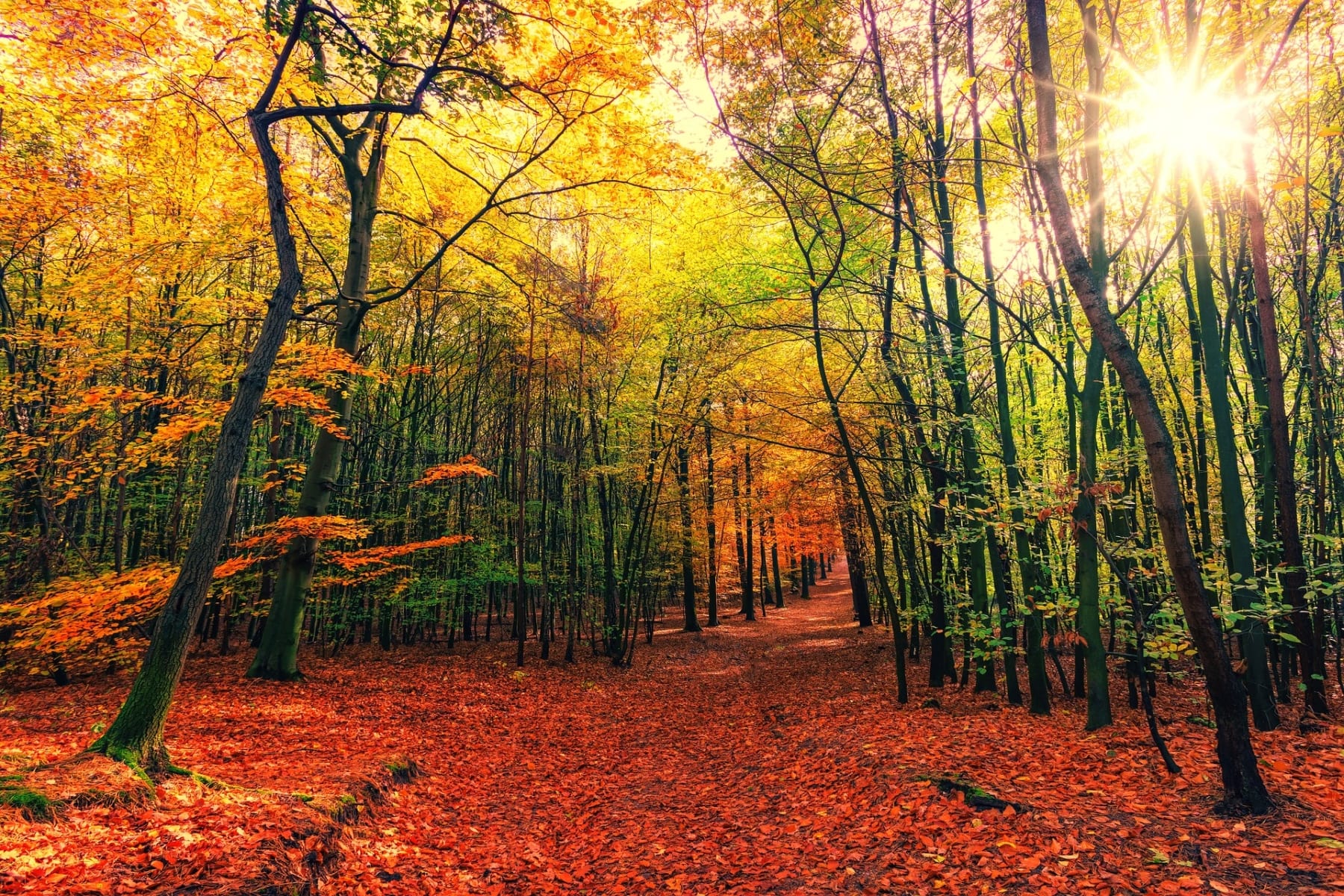There’s something about being in nature that makes you feel better. Inhaling fresh clean air and the deep aroma of the forest, the recognizable melody of animals and plants of the forest, and the stunning beauty all around unite to ease stress and worry and help you think more clearly. Bathed in the proverbial forest, your mood is enhanced, body rejuvenated, spirit recharged, and energy and vitality restored.
What is forest bathing (forest therapy)?
A decades-old practice in Japan, forest bathing (or shinrin-yoku), literally means to bathe in the atmosphere of the forest using all of your basic senses—sight, touch, hearing, smell, and taste. It involves a profound connection with nature, bridging the gap between us and the natural world. Slowing down and immersing yourself in the natural environment has become an important part of preventative healthcare in Japan. Critics may ridicule this practice as nothing more than a stroll through a forest, but the growing body of evidence suggests that getting outside in nature is food for the mind, emotions, body, and spirit.
People who use essential oils are familiar with the terms terpenes and terpenoids. Inhaling these volatile organic compounds found in all essential oils provides a broad range of biological activities that support human health. Similarly, terpenes and terpenoids emitted by the trees of forests “bathe” us in beneficial volatile organic compounds when walking among nature. These compounds may reach their peak concentration during daylight hours, on clear calm days, from noon to the early afternoon, particularly in forest dominated by conifer trees. (1)
For such a simple health strategy, forest bathing provides huge benefits. Here are some of the benefits science has revealed so far.
Aid cardiovascular health
Your blood pressure is a major indicator of cardiovascular fitness. High blood pressure can damage arteries and increase the risk that they will clog, threatening both your health and quality of life. Japanese researchers studied the effects of walking in a forest on blood pressure. Middle-aged adults who walked in a forest for 90 minutes experienced reduced systolic and diastolic blood pressure as well as reduced stress. (2)
Another study tested the effects of forest bathing on middle-aged men with blood pressure on the high side of normal. The men strolled through the forest, practiced deep breathing, and were allowed periods of time to lie down in the forest. Systolic and diastolic blood pressure, as well as cortisol, all significantly decreased after forest bathing. Moreover, the participants reported improved mood and feeling more relaxed and natural. (3)
A third study evaluating elderly persons with high blood pressure showed that blood pressure was not lowered by forest therapy, but salivary cortisol levels significantly decreased. (4) Quality of life also improved. A reduction in salivary cortisol levels suggests the participants were less stressed. Cortisol plays a role in increased blood pressure. The reduction in cortisol and increased quality of life means that forest bathing may be useful as part of an overall high blood pressure management program.
The cardiovascular benefits of forest bathing aren’t just for the middle-aged or elderly though, research shows that young people can benefit as well. When comparing walking in a forest to urban walking among young adults, researchers found that nervous system activity was balanced towards relaxation, which relaxed the cardiovascular system. (5) Overall, this suggests that forest bathing may support cardiovascular longevity.
Benefits of forest bathing have even been observed in people with chronic heart failure. (6),(7),(8)
Improve emotional and mental health
Most anyone who has walked through a forest or even a fruit orchard can tell you that they felt more relaxed. Interestingly, researchers found that just viewing a kiwifruit orchard image can reduce stress. Middle-aged females were split into two groups. One group viewed a kiwifruit orchard image for 10 minutes while the other group viewed an urban building for the same amount of time. The group that viewed the fruit orchard image experienced increased parasympathetic nervous system activity (a sign of recovery and relaxation), a modest decrease in heart rate, and reported feeling more comfortable and relaxed as well as an improved mood state. (9) Maybe you should plaster your office or another room with nature pictures.
A larger study of almost 500 participants showed that forest bathing significantly reduced hostility, depression, and stress in people who were chronically stressed. (10) Interestingly, the more stressed a person was, the greater the benefits of the forest therapy. Similar findings were reported among people who had depressive tendencies when compared to those who did not. While both groups of people realized physiological and psychological benefits after a day-long session of forest bathing, people with depressive tendencies had more dramatic responses. (11) Mother Nature seems to recognize those who need her loving care the most and delivers extra benefits to them.
Remarkably, other researchers found that forest bathing improved mental health measurements in people being treated for a psychotic illness in in a psychiatric hospital. (12) Patients at the hospital were taking to a local forest covered mainly by conifer trees (Scots Pine, Norway Spruce) and some oak and common beech trees. They were encouraged to walk and participate in other exercises like stretching for 105 minutes. The greatest improvements were seen in confusion and depressive-dejection feelings and a significant decrease in anxiety was observed.
Even shorter walks of 15 minutes in nature can improve mental and emotional health. (13)
Relieve pain and reduce inflammation
Chronic pain can significantly reduce quality of life and take a toll on physical, mental, and emotional health. Adults aged 25 to 49 were taken to a forest filled with pine, oak, and maple trees for two days and participated in various indoor and outdoor activities. At the end of the two days, forest bathing improved both psychological and physical measures. The participants reported less pain and depression and a significant improvement in quality of life. (14) Amazingly, the forest therapy also improved their immune function as indicated by enhanced natural killer cell activity.
Exercising in the forest may provide greater benefits according to one study. The researchers compared the pain-relieving effects of forest bathing in comparison to forest bathing with exercise in people with chronic neck pain. People in the forest bathing with exercise group experienced greater neck pain relief than those in the forest bathing group alone. (15)
Another study found that two-hours of exposure to a forest reduced inflammatory cytokine levels in young adults. (16) Reduced inflammatory cytokines indicates forest bathing can reduce systemic inflammation. The forest intervention also increased antioxidant capacity.
Improve respiratory and immune function
Chronic obstructive pulmonary disease (COPD) is a chronic inflammatory lung disease characterized by difficulty breathing, cough, wheezing, and excess mucus production. Forest bathing significantly decreased proteins—perforin and granzyme B—released by natural killer cells that are involved in the progression and activity of COPD in elderly individuals with COPD. (17) The therapy also reduced pro-inflammatory cytokine and stress hormone levels and improved overall mood state. Based on the findings, the researchers concluded forest bathing has a positive health effect on elderly people with COPD.
Speaking of natural killer cells, these white blood cells play a major role in the fight against cancer and viruses. Adults who participated in three-day and 2-night forest bathing trips experienced increased natural killer cell activity that lasted for 30 days after completion of the trip. (18) Forest therapy also improved levels of proteins released by natural killer cells that attack viruses and cancerous cells. In contrast, a trip to the city had no effect of natural killer cell numbers or activity. Forest bathing appears to have long-term benefits on immune system function.
Three additional studies noted increased natural killer cell activity and levels of anti-cancer proteins in people of various ages after trips to a forest. (19),(20),(21) So, a monthly trip to the forest may protect you against infections and reduce your risk of cancer.
Conclusion
The existing research is clear. Humans have an intimate connection to nature and immersing yourself in a natural environment has huge human health benefits. If you need a mood reset, want to reduce stress, or improve your physical health, make every effort to inhale the health-promoting aroma of a forest at least once per month.




